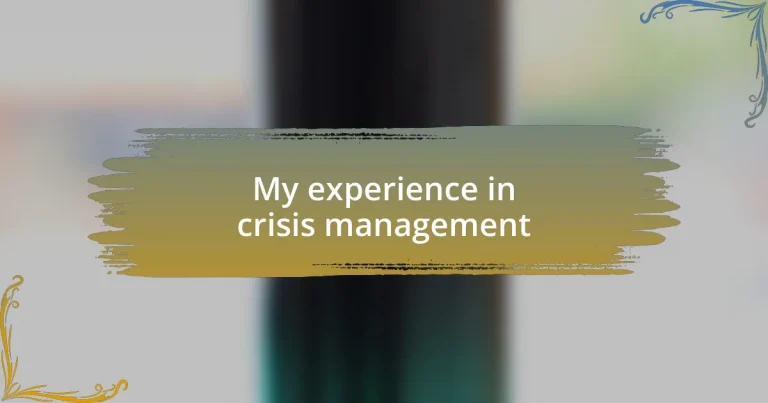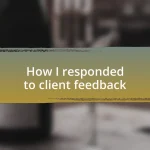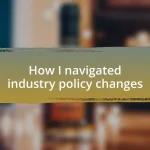Key takeaways:
- Effective crisis management requires clear communication and understanding of stakeholders to foster trust and reduce panic.
- Identifying personal triggers for alcohol, such as stress and social pressures, is essential for healthier decision-making.
- Establishing clear limits and practicing mindfulness can empower individuals to manage alcohol consumption better.
- Acknowledging one’s limits, sharing struggles with trusted friends, and engaging in self-reflection are critical steps toward personal growth and recovery.
Author: Clara Whitmore
Bio: Clara Whitmore is an acclaimed author and storyteller known for her captivating narratives and richly drawn characters. Her work spans several genres, including contemporary fiction and historical romance, often weaving elements of personal experience into her writing. Clara holds a Master’s degree in Creative Writing from the University of Edinburgh and has published three novels, which have garnered critical acclaim and a loyal readership. When she’s not writing, Clara enjoys exploring quaint bookstores and hosting literary workshops. She currently resides in Portland, Oregon, with her dog, Jasper.
Understanding crisis management concepts
Crisis management is fundamentally about responding to unexpected events that threaten an organization’s reputation or operations. I remember a time when I faced a sudden backlash from a product review that went viral for all the wrong reasons. In that moment, I realized how crucial it is to have a preemptive strategy in place; the stakes are high, and the right approach can mean the difference between recovery and downfall.
One of the key concepts in crisis management that often gets overlooked is the importance of communication. Early in my career, during a distressing crisis, we crafted a message aimed at transparency. It struck me how this simple act of honesty fostered trust and reassured our audience. Have you ever experienced a situation where clear communication turned a potentially damaging moment into a chance for connection?
Additionally, understanding the stakeholders involved can make a significant difference. I’ve observed that different audiences require tailored messages; a one-size-fits-all approach rarely works. When I navigated a crisis with various affected groups—employees, customers, and investors—I found that engaging with each stakeholder differently helped reduce panic and foster understanding. It’s fascinating how personalizing communication can transform a crisis into an opportunity for growth, isn’t it?
Identifying personal triggers for alcohol
Identifying personal triggers for alcohol is a crucial step in managing any crisis related to drinking. I distinctly remember a time when stress from work pushed me toward a drink, showing me that my emotions were closely tied to my choices. Have you ever noticed how certain environments or situations make cravings stronger? Recognizing those moments can illuminate patterns that need addressing.
Reflecting on my own experiences, I’ve come to understand how social pressures can act as significant triggers. At gatherings where everyone indulges, I often felt compelled to join in, even when I had no desire to drink. It’s fascinating how the need to fit in can overshadow our personal goals. Have you faced similar challenges in social settings? Acknowledging this can empower us to set boundaries and make healthier decisions.
Additionally, personal memories tied to alcohol can be profound triggers. I recall celebrations with family where drinks flowed freely, making it tough to separate joy from alcohol. This realization helped me create new habits that allow me to enjoy those moments without relying on drinking. Understanding these layers of influence is vital, as it transforms our relationship with alcohol and leads to healthier choices.
Strategies for managing alcohol consumption
One of the most effective strategies I’ve implemented for managing alcohol consumption is setting clear limits before social situations. I recall a particular party where I decided in advance to stick to just two drinks. It wasn’t easy, especially as the atmosphere encouraged more, but I found that having a plan made it easier to resist temptation. Have you ever noticed how having a goal can anchor your choices and keep you focused?
Another approach that has worked for me is substituting non-alcoholic beverages in social settings. I remember a night out when I ordered sparkling water with a lime instead of a cocktail. To my surprise, it not only kept me hydrated, but it also helped me feel included without the haze of alcohol. This simple switch transformed my experience—can you think of alternatives that you enjoy? Finding enjoyable replacements can enrich your social interactions just as much.
Mindfulness has also played a critical role in my journey. By tuning into how I feel before and after consuming alcohol, I’ve become more aware of its true impact on my mood and energy. I often ask myself: did that drink enhance my experience, or was I merely drinking out of habit? This level of self-awareness instills a greater sense of control, allowing me to make decisions aligned with my well-being rather than just following social norms.
My journey through alcohol-related crises
My journey through alcohol-related crises wasn’t just a series of choices; it felt like a complex puzzle I was trying to solve. I’ll never forget the time I found myself in a chaotic situation after over-indulging at a gathering. The visuals of my friends laughing and the music blaring faded into a fog, and I realized I was losing control. Have you ever had that moment where the environment shifts from celebratory to overwhelming?
There was another episode that left a significant mark on me—a close friend reached out during a challenging time and confirmed my suspicions: my drinking habits were impacting not just me, but those around me. It was heartbreaking to learn that my choices elicited concern and worry among my loved ones. This revelation brought me a wave of guilt but also served as a profound wake-up call. How often do we consider the ripple effects of our actions on others?
Looking back, I see those crises as turning points that prompted growth. I remember one instance where I chose to skip a couple of social events rather than risk stumbling back into my old habits. At first, it felt isolating, like I was missing out. But gradually, I found alternative pathways that didn’t revolve around alcohol. Have you ever discovered a new hobby or interest that surprised you? For me, it was exploring nature trails, and it fulfilled me in ways I hadn’t expected.
Lessons learned from my experiences
Throughout my experiences, I learned that acknowledging my limits was crucial. I still remember a night when I pushed past my usual boundaries, thinking I could handle it. The regret I felt the next morning was a stark reminder that moderation is not just a suggestion; it’s essential for preserving both mental and physical health. Have you ever regretted a choice that seemed harmless at the moment?
Another important lesson was understanding the value of communication. I realized that sharing my struggles with trusted friends created a support system I desperately needed. I was surprised by how many people resonated with my experiences, and this connection added a layer of accountability. It transformed my process from a solitary battle to a shared journey. Have you found strength in expressing your challenges to someone?
Finally, I discovered that self-reflection was a powerful tool for growth. After each crisis, I took the time to journal my thoughts and emotions. This practice helped me identify patterns in my behavior and recognize triggers that led to unhealthy decisions. It was eye-opening to see the connection between my emotions and choices. Have you ever reflected on your actions and learned something profound about yourself? For me, that was a game changer.
Tips for effective crisis management
When facing a crisis, prioritizing your response is key. I remember a situation where I was overwhelmed by conflicting emotions during a tough night. Instead of making impulsive decisions, I took a moment to breathe and assess the areas of my life that needed immediate attention. How often do we rush into action without considering our options?
Planning ahead can significantly decrease the chaos of a crisis. After experiencing a few unpredictable moments, I learned to set aside time for preparation, even if it felt redundant initially. I devised a simple checklist to guide me through potential pitfalls related to my drinking habits. Believe me, having a clear plan can provide a sense of control that’s incredibly comforting in turbulent times. Have you ever wished for a roadmap when the waters got choppy?
Another crucial tip is to seek immediate support when needed. On one occasion, I felt isolated in my struggles, but reaching out to a trusted friend transformed my outlook. Their perspective gave me clarity and shifted my focus from despair to action. This interaction reminded me of how powerful it can be to lean on others. Do you have someone you can rely on during tough moments? Building that support network can be life-changing.


